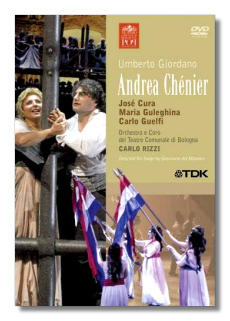
The Internet's Premier Classical Music Source
Related Links
- Latest Reviews
- More Reviews
-
By Composer
-
Collections
DVD & Blu-ray
Books
Concert Reviews
Articles/Interviews
Software
Audio
Search Amazon
Recommended Links
Site News
 DVD Review
DVD Review
Umberto Giordano

Andrea Chénier
- José Cura (Andrea Chénier)
- Maria Guleghina (Maddalena di Coigny)
- Carlo Guelfi (Carlo Gérard)
- Giacinta Nicotra (Bersi)
- Cinzia De Mola (La Contessa di Coigny)
- Pierre Lefèbvre (Un Incredibile)
Orchestra e Coro del Teatro Comunale di Bologna/Carlo Rizzi
TDK DVD DVWW-OPACH 123min LPCM Stereo DTS Dolby Digital Widescreen - Region 1 Only
Giordano's chestnut is one of the few operas in which the tenor almost consistently upstages the soprano, her "La mamma morta" notwithstanding. Great Chéniers of the recent past include Domingo, Carreras, del Monaco, and Corelli, all of whom made commercial recordings of the role. A blood-and-thunder drama set against the turbulence of the French revolution, and ending with the tenor and soprano going off to the guillotine hand-in-hand, Andrea Chénier seldom is presented with much subtlety on the part of singers, conductors, and stage directors. Nevertheless, a little restraint is a good thing, and while some of the visual aspects of this production go over the top, the music has been treated with care, and the mastery of Giordano's score is demonstrated.
This production (taped live in January 2006 in Bologna's Teatro Comunale) has been staged by Giancarlo del Monaco – Mario del Monaco's son – who also designed the sets and costumes. His direction is curiously static, particularly in scenes involving the chorus. When someone is not singing, he seems at a loss to know what else they should be doing. Worse, he has gone overboard with the wigs, powder, and makeup in Act One, so much so that the Contessa di Coigny, her staff, and her guests look like the Evil Clown Committee. In the second and third acts, the women in the chorus are tarted up, as if they were extras from a production of The Threepenny Opera. At the start of Act One, there's no sign of a blue sofa. Instead, Gérard's father wheels in a dressmaker's dummy and weakly paws at the hem of its garment for several moments before wheeling it off again. Some ideas work better. At the end of Act Three, a giant grille descends at the front of the stage to form Chénier's Act Four prison. As the opera ends, instead of being ushered to the guillotine, Chénier and Maddalena clamber up that same grille and assume triumphant attitudes, to echo their final words, "Long live death together!"
This production's Chénier is the Argentine tenor José Cura. He sang Chénier's two major arias on his "Verismo" CD, and his performance here remains similar – heroic, yet thoughtful. This is a much subtler interpretation than Mario del Monaco's and Corelli's. Cura is handsome, credible, and, at times, quite touching. (I confess to getting choked up during "Un dì, all'azzurro spazio.") At other times, he seems a little uninvolved, particularly during the love scenes. His Maddalena is Maria Guleghina, a healthy, even earthy figure, and therefore not at all credible in Act One. Her big voice provides plenty of excitement, and if there are occasional pitch problems, they can be forgiven in the heat of the moment. "La mamma morta" goes very well, in spite of del Monaco's staging, which is bland except for the spotlight, which is blindingly shone in Ms. Guleghina's face. Carlo Guelfi's lightweight Gérard makes a sympathetic effect in Act One, but he is not a convincing revolutionary in the rest of the opera, and "Nemico della patria," while nicely sung, lacks conviction. Among the smaller roles, the wheezy, insinuating Incredible of Pierre Lefèbvre is a standout. Rizzi's conducting, while not missing the requisite Italianate sweep, allows plenty of time to let the score's many felicities, including its scoring, register on our ears.
If your criterion for Andrea Chénier is that it give you compelling drama, this production will suffice, although the drama comes mostly from the music, not the staging.
This DVD contains only the opera, with no supplementary material. The sound is in the expected three formats, and the picture is Anamorphic Widescreen. The English subtitles are adequate but not idiomatic, and there are occasional solecisms.
Copyright © 2006, Raymond Tuttle




















